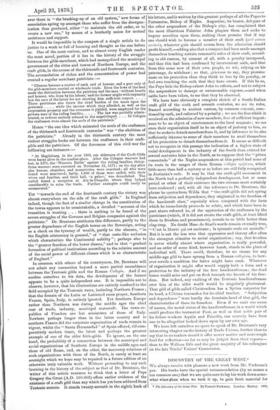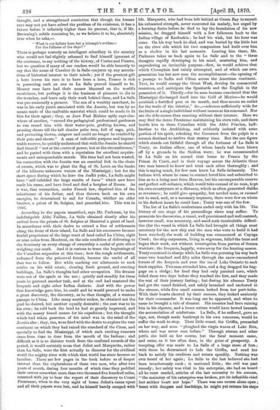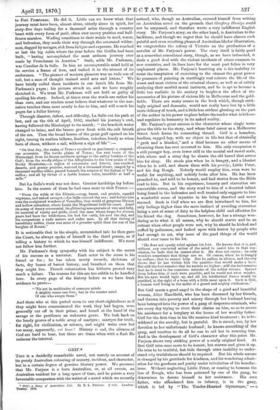DISCOVERY OF THE GREAT WEST.* WE always receive with pleasure
a new work from Mr. Parkman's pen. His books have the special recommendation (by no means a too common one) that we are quite sure to lay his work down some- what wiser Allan when we took it up, to gain fresh material for
• 77e Discovery of The Great West. By Francis Parkman. London: Murray. 1869.
thought, and a strengthened conviction that though the human race may not yet have solved the problem of its existence, it has a future before it infinitely higher than its present, that is, if Mr. Browning's subtle reasoning be, as we believe it to be, absolutely true when he asks,— " What is our failure hero but a triumph's evidence For the fullness of the days?"
There is perhaps scarcely an intelligent schoolboy in the country who would not feel slightly ashamed to find himself ignorant of the existence, to say nothing of the history, of Cortez and Pizarro, but we question if many of our readers would be able honestly to say that the name of Cavelier de la Salle conjures up any associa- tions of historical interest to their minds ; yet if the greatest gift a hero leaves his race is to have been a hero, France is rich in possessing such an one as La Salle proved himself to be. Meaner men have had their names blazoned on the world's escutcheon, but perhaps it is the business of pioneers to die in the trenches, and leave only their work behind them, and La Salle was pre-eminently a pioneer. The son of a wealthy merchant, he was in his early youth associated with the Jesuits, but was by no means made of the malleable material which could be made to fit him for their agent ; they, as Jean Paul Richter aptly says else- where of another, "caused the pedagogical professional gardeners to run round him with their water-pots, grafting knives, and pruning shears till the tall slender palm tree, full of sago, pith, and protecting thorns, outgrew and could no longer be reached by their pots and shears." A man of inflexible purpose and impene- trable reserve, he quickly understood that with the Jesuits he should find himself "not at the centre of power, but at the circumference," and he parted with them with a reputation for excellent acquire- ments and unimpeachable morals. His time had not been wasted, his connection with the Jesuits was an essential link in the chain of events, which was to plant the flag of St. Louis on the banks of the hitherto unknown waters of the Mississippi ; but for the short space during which he bore the Jesttit yoke, La Salle might have " self-infolded the large results of force" which now have made his name, and have lived and died a burgher of Rouen. As it was, that connection, under French law, deprived him of the inheritance of his father, and thus thrown back on his own energies, he determined to sail for Canada, whither an elder brother, a priest of St. Sulpice, had preceded him. This was in 1666.
According to the papers unearthed, says Mr. Parkman, by the indefatigable Abbe Faillon, La Salle obtained shortly after his arrival from the priests of St. Sulpice at Montreal a grant of land. In accordance with their desire to extend a line of settlements along the front of their island, La Salle and his successors became feudal proprietors of the large tract of land called La Chine, eight or nine miles from Montreal, on the sole condition of delivering to the Seminary on every change of ownership a medal of pure silver weighing one mark. And it is curious to trace the beginnings of the Canadian seignories at this time ; how the rough settlements, redeemed from the primeval forests, became the nuclei of all that was to follow. But while marking out allotments to each settler on his wild estate, clearing fresh ground, and erecting buildings, La Salle's thoughts had other occupation. His dreams were not of the spade or the axe ; quietly and steadily for three years he pursued another task, and at the end had mastered the Iroquois and eight other Indian dialects. And with the power that knowledge gave him, he could and he would proceed to make a great discovery, the discovery, as he then thought, of a western passage to China. Like many another seeker, he obtained not the goal he desired, but another equally desirable ; the cost was to be his own ; be sold back the land he had so greatly improved, and with the money found means for his expedition ; but the thought which had taken possesion of his mind was in the mind of the Jesuits also ; they, too, were fired with the desire to explore the vast continent on which they had raised the standard of the Cross, and specially to find the Mississippi, of which such exciting rumours came from time to time from the mouth of the Indians ; and difficult as it is to disinter truth from the confused records of the period, it would certainly seem that Joliet and Marquette, rather than La Salle, were the first actually to discover for the civilized world the mighty river with which that world has since become so familiar. There are few pages in the book before us of deeper interest than the explorations of these two men, who after two years of search, during four months of which time they paddled their canoes somewhat more than two thousand five hundred miles, returned with joy to bear the report of their discovery to Count Frontenac, when in the very sight of home Joliet'a canoe upset and all their papers were lost, and he himself barely escaped with life. Marquette, who had been left behind at Green Bay to recruit his exhausted strength, never recovered his malady, but urged by a burning desire before he died to lay the foundation of his new mission, he dragged himself with a few followers back to the Indian village of Kaskaskia ; he had his wish, but his hour was come. On his way back he died, and was buried by the little hut on the river side which his two companions had built over him as a shelter in his last moments. Leaving him there, Mr. Parkman takes us back again to La Salle and to the "three thoughts rapidly developing in his mind, mastering him, and engendering an invincible purpose—first, he would achieve that which Champlain had vainly attempted, and of which our own generation has but now seen the accomplishment—the opening of a passage to India and China across the American continent. Next, he would occupy the Great West, develop its commercial resources, and anticipate the Spaniards and the English in the possession of it. Thirdly—for he soon became convinced that the Mississippi discharged itself into the Gulf of Mexico—he would establish a fortified post at its mouth, and thus secure an outlet for the trade of the interior," &c.,—schemes sufficiently wide for the brain of a single individual without means at his command. Nor are the side-scenes then enacting without their interest. Here we may find the fierce Frontenac maintaining his stern rule, and there beside him in those Canadian wilds the Abbe Fendlon, half- brother to the Archbishop, and evidently imbued- with some portion of his spirit, rebuking the Governor from the pulpit in a sermon destined to outlive that stormy time. But the one figure which stands out faithful through all the fortunes of La Salle is Tonty, an Italian officer, one of whose hands had been blown off by a grenade in the Sicilian wars ; he was recommended to La Salle on his second visit home to France by the Prince de Conti, and in their voyage across the Atlantic these two men learned to know and trust each other thoroughly ; and this is saying much, for few men knew La Salle intimately. The Indians with whom he came in contact loved him and submitted to him as to a being sent from Heaven, but his unconquerable reserve and perfect self-reliance, which would take counsel of no man, kept his own countrymen at a distance, which as often generated dislike as reverence ; he could give sympathy, but needed none, or seemed not to need, and, as a necessary sequence, there were few on whom in his darkest hours he could lean ; Tonty was one of the few.
The list of La Salle's misfortunes ended only with his life. The history of one stage of his proceedings alone may suffice. To prosecute his discoveries, a vessel, well provisioned and well manned, however small, was necessary, and amid such incalculable difficul- ties (for the vessel in which La Salle had brought all things most necessary for the new ship and the men who were to build it had been wrecked) the work of building was commenced at Cayuga Creek ; the ship carpenters, living in wigwams, felled the trees and began their work, not without interruption from parties of Seneca warriors ; the Iroquois, happily, were away for the hunting season. Tonty remained in charge while La Salle was pursuing his way back some two hundred and fifty miles through the snow-encumbered forests of the Iroquois and over the ice of Lake Ontario to seek fresh supplies. Two men attended him, and a dog dragged his bag- gage on a sledge ; for food they had only parched corn, which failed them two days before they reached the fort, and they made the rest of their journey fasting ; but during his absence Tonty had got the vessel finished, and safely launched and anchored in the stream, while five small cannon looked from her port-holes. With their hearts cheered by their success, they looked anxiously for their commander. It was long ere he appeared, and when he came he brought a tale of disaster. His enemies had been ruining him in his allsence, and a lesser nature would have bowed beneath the accumulation of misfortune. La Salle, if he suffered, gave no sign, nor, though made bankrupt in his own resources, would he suffer the work to stop. Their little vessel, the Griffin, proceeded on her way, and soon ploughed the virgin waves of Lake Erie, where sail was never seen before." Through storms and other perils she held on her course, but the fatal moment came, and came, as it too often does, in the guise of prosperity. A tempting offer was made to La Salle of a large store of furs ; with these he determined to lade the Griffin, and send her back to satisfy his creditors and return speedily. Nothing was ever heard of her again ; La Salle to the last believed she had been treacherously sunk ; it mattered little ; the evil was past remedy ; her safety was vital to his enterprise, she had on board all he most needed, articles of the last necessity to his success, "the mainstay of his enterprise was broken, yet its inflexible chief lost neither heart nor hope." There was one course alone open ; beset with dangers and hardships, he might yet retrace his steps
to Fort Froatenac. He did it. Little can we know what that journey must have been, almost alone, utterly alone in spirit, for sixty-five days toiling for a thousand miles through a country • beset with every form of peril, often over snowy prairies and half- frozen marshes. Wading sometimes to their waists in mud, water, and bulrushes, they made their way through the saturated wilder- ness, dogged by savages, sick from fatigue and exposure. He reached at last the log cabin where the year before the Griffin had been "having accomplished the most arduous journey ever made by Frenchman in America." Such, adds Mr. Parkman, was Cavelier de la Salle. In him an unconquerable mind held at its service a frame of iron, and tasked it to the utmost of its endurance. "The pioneer of western pioneers was no rude son of toil, but a man of thought trained amid arts and letters." We have briefly culled these incidents in our hero's life from Mr.
Parkman's pages ; his picture struck us, and we have roughly sketched it. We trust Mr. Parkman will not hold us guilty of spoiling his story. Indeed, at times even the words are rather his than ours, and our readers must believe that whatever in the nar- rative touches them most nearly is due to him, and will search his pages for a fuller history.
Through disaster, defeat, and difficulty, La Salle cut his path at last, and on the 6th of April, 1682, reached his journey's end, having followed the Mississippi to its mouth ; "the brackish water changed to brine, and the breeze grew fresh with the salt breath of the sea. Then the broad bosom of the great gulf opened on his sight, tossing its restless billows, limitless, voiceless, lonely as when born of chaos, without a sail, without a sign of life " :—
" On that day, the realm of France received on parchment a stupend- ous accession. The fertile plains of Texas ; the vast basin of tho Mississippi, from its frozen northern springs to the sultry borders of the Gulf; from the woody ridges of the Alleghanies to the bare peaks of the Rocky Mountains,—a region of savannahs and forests, sun-cracked deserts, and grassy prairies, watered by a thousand rivers, ranged by a thousand warlike tribes, passed beneath the sceptre of the Sultan of Ver- sailles; and all by virtue of a feeble human voice, inaudible at half a
mile."
But La Salle's work was not done. Greater hardships lay before him. In the course of them he had once more to visit France :—
"From the wilds of the Illinois,—crag, forest, and prairie, squalid wigwams, and naked savages,—La Salle crossed the sea ; and before him rose the sculptured wonders of Versailles, that world of gorgeous illusion and hollow splendour, where Louis the Magnificent held his court. Amid its pomp of weary ceremonial, its glittering masquerade of vice and folly, its carnival of vanity and pride, stood the man whose home for sixteen years had been the wilderness, his bed the earth, his roof the sky, and his companions a rude nature and ruder men. In all that throng of hereditary nobles, there was none of a prouder spirit than the son of the burgher of Rouen."
It is noticeable that in the simple, unvarnished tale he then gave the Court, he always spoke of himself in the third person, as if telling a history to which he was himself indifferent. We must not follow him further.
Mr. Parkman's deep sympathy with his subject is the secret of his success as a narrator. Each actor in the scene is his friend or foe ; he has taken musty records, skeletons of facts, dry bones of barest history, and breathed on them that they might live. French colonization has hitherto proved very much a failure. The reasons for this are too subtle to be handled here. In every page of the history before us we have fresh evidence to prove- " 'Tis not in multitudes of common minds
A mighty cause can live; but in the master mind Of one who sways them."
And those who at this period seem to our short-sightedness as if they might have consummated the work they had begun, were generally cut off in their prime, and found at the hand bf the savage or the pestilence an unknown grave. We look back on the lonely graves of a noble army of martyrs ; martyrs for truth, for right, for civilization, or science, and might write over but too many, apparently, cui bono? History is sad, the silences of God are hard to bear, but there are times when with a flash He redeems the interval.
































 Previous page
Previous page